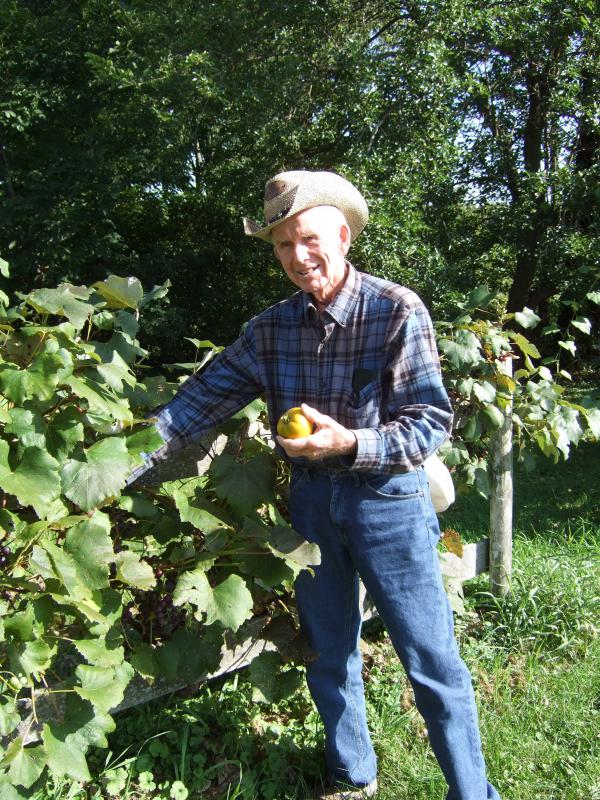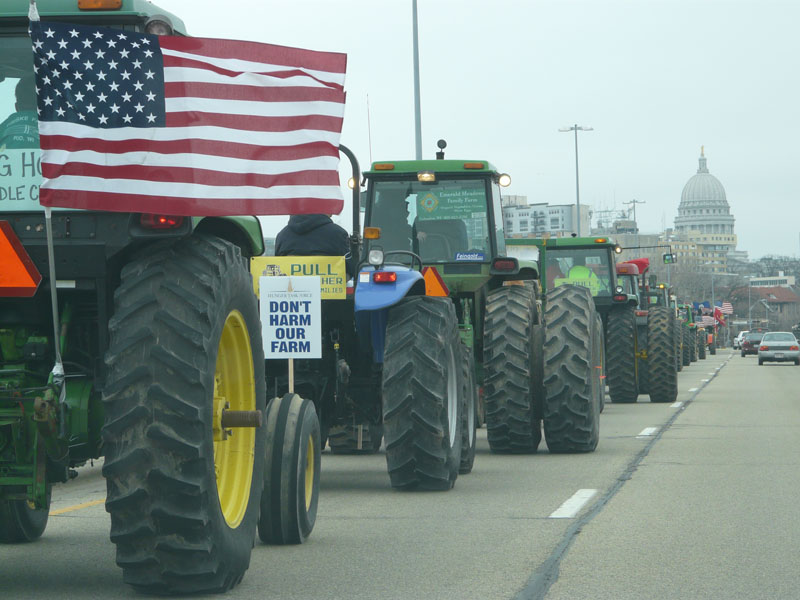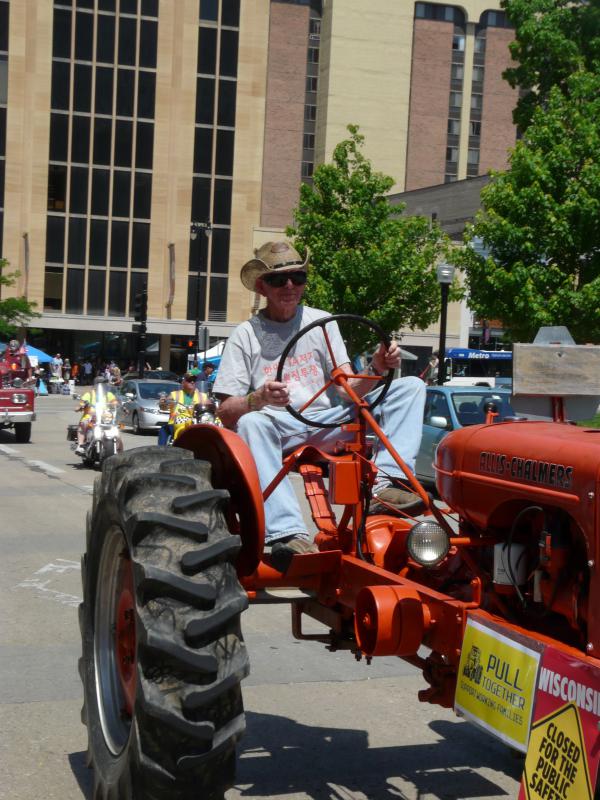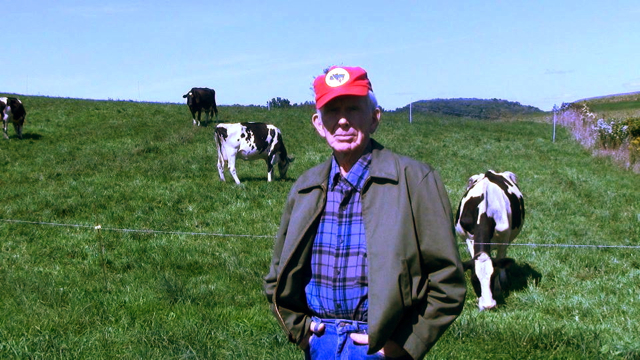Submitted by Rebekah Wilce on
lJohn Kinsman, a leader of the global food sovereignty movement who was deeply committed to equality, justice, and peace, passed away on January 20, 2014. In honor of his inspirational life and work, the Center for Media and Democracy's Food Rights Network is republishing the following 2011 profile of this "food and farm hero." For information about the funeral service, and to find out how to share some of his legacy, please visit the website of the organization he founded 20 years ago: the Family Farm Defenders.
In the world of food and farming, the contrast between corporate agribusiness "farms" and small, sustainable family farms -- farms that, to adapt a phrase of Michael Pollan's, our grandparents would recognize as food-producing places -- is especially clear. Among the farmers who live and work in these places, the CMD's Food Rights Network is featuring some of the heroes: farmers who are making an incredible difference in the farming community, on our dinner tables and in the world around them.
John Kinsman
 John Kinsman is a dairy farmer from Lime Ridge, Wisconsin. He is a pioneer of rotational grazing, a strong proponent of small, diversified agricultural operations, and an activist since the 1970s.
John Kinsman is a dairy farmer from Lime Ridge, Wisconsin. He is a pioneer of rotational grazing, a strong proponent of small, diversified agricultural operations, and an activist since the 1970s.
Activism
Mr. Kinsman, who is now in his eighties, helped establish a cultural exchange in the early 1970s between black children from Mississippi and white children from Wisconsin called Project Self-Help and Awareness (PSA). As a result of this work, he met and interacted with Southern black farmers filing discrimination complaints against the USDA that resulted in the Pigford v. Glickman trial and settlement. "That helped me to see how broad the picture is, of how agriculture and urban life and factory workers and everyone fit together," Kinsman says.
When the National Family Farm Coalition (NFFC) was founded in 1986, Kinsman got a ride to the first meetings from friends who "drove out of their way from Northwestern Wisconsin to come over here and pick me up -- and I know they were four hours out of their way both ways -- to make sure I went to ... these organizing meetings. ... And of course, once I went, I was hooked!"
In 1994, Kinsman and others founded the Family Farm Defenders (FFD), which he says was formed "to include at least forty percent urban people, because we were finding that our urban friends cared more about family farmers" than some farmers did, "and understood the reasons for caring about them."
 FFD's mission, according to its website, is "to create a farmer-controlled and consumer-oriented food and fiber system, based upon democratically controlled institutions that empower farmers to speak for and respect themselves in their quest for social and economic justice. To this end, FFD supports sustainable agriculture, farm worker rights, animal welfare, consumer safety, fair trade, and food sovereignty."
FFD's mission, according to its website, is "to create a farmer-controlled and consumer-oriented food and fiber system, based upon democratically controlled institutions that empower farmers to speak for and respect themselves in their quest for social and economic justice. To this end, FFD supports sustainable agriculture, farm worker rights, animal welfare, consumer safety, fair trade, and food sovereignty."
Fighting rBGH
Starting in 1985, Kinsman also advocated for banning the use of and experimentation with bovine growth hormone. At the time, American Cyanamid started experimenting with synthetic bovine growth hormone, or rBGH, at the University of Wisconsin, and serving the resulting dairy products on campus through Babcock Hall. Says Kinsman:
We went to some of the early meetings of the scientists from the University, who were so excited about the increased milk production. Thirty percent, which meant -- and they said it! -- it would put thirty percent more farmers off the land because of that much over-production.
Fifty percent of all the dairy products at that time -- and that's twenty-six years ago -- that were sold at the University of Wisconsin and the University Hospital, fifty percent of all the milk, cottage cheese, the cheese, the butter, everything that was manufactured in Madison at Babcock Hall and other places (ice cream!) came from these experimental cows. No one knew about it except this small group of people, and they weren't even informed of it.
Because we couldn't get any attention, I used my civil rights experience and wrote up a placard, or a sign on a stick. It said, "Do you know you're a guinea pig?" and so on, for this experiment. Then I made up some, at the beginning very crude, information sheets, and I would go in front of the Memorial Union and hand out this information once a week for ten weeks.
Kinsman continued to educate farmers and consumers about the negative effects of bovine growth hormone. According to the National Family Farm Coalition website, "as a result of his efforts, the Food and Drug Administration forestalled rBGH approval for seven years and bovine growth hormone is now struggling in the marketplace." This led into his work with international family farm groups like Via Campesina, which fight these issues on an international level.
Farming
 Kinsman's small dairy farm of thirty-six milking cows and about thirty younger cattle is in the hilly "Driftless" region of Wisconsin. Of his family's 200 acres, only about 85 of them can be worked or even pastured. "It's very rough," he says. "Part of the pasture looks like Stonehenge with huge rocks, and there's buried rocks all over the farm. The rest of the land is in permanent trees."
Kinsman's small dairy farm of thirty-six milking cows and about thirty younger cattle is in the hilly "Driftless" region of Wisconsin. Of his family's 200 acres, only about 85 of them can be worked or even pastured. "It's very rough," he says. "Part of the pasture looks like Stonehenge with huge rocks, and there's buried rocks all over the farm. The rest of the land is in permanent trees."
He and his wife purchased the land sixty years ago from an elderly neighbor who had been forced to rent out the land to farmers who "took the crop off and paid her so much an acre for using the land until it was so worn out that it couldn't produce anymore." But, as a young couple just getting started, they could afford it, so they began building it back up.
According to Kinsman, "I knew the only way to do it was to get organic matter back in the soil, so any time I see a leaf fluttering away, I think, 'Oh my gosh, it should be put into the soil!' ... That's tremendous fertilizer. The roots [of the trees] go down and bring up minerals that you don't get otherwise. ... It became very productive, but it took many years."
The milk from the farm is sold to Cedar Grove Cheese, a cheesemaker 20 miles from the farm, in Plain, Wisconsin. Cedar Grove's owner, Bob Wills, buys milk from over 30 Wisconsin farmers, all of whom -- organic or not -- have pledged not to treat their cows with synthetic growth hormones. Kinsman says they all also pasture their cows. In exchange, Wills "tries to pay top prices" and has "helped us develop a fair trade cheese project starting thirteen years ago" wherein "any of the cheese that we sell through the Family Farm Defenders gets a fair trade price... and all the farmers in his plant get a share of that."
 Kinsman now shares the farm with a partner, who, he says, "is now doing the lion's share of the heavy work, and he gets half the milk check and pays half the usual expenses and gets half of the increase (every other calf born is his). ... This 85 acres is supporting more than one family -- most of his and mine."
Kinsman now shares the farm with a partner, who, he says, "is now doing the lion's share of the heavy work, and he gets half the milk check and pays half the usual expenses and gets half of the increase (every other calf born is his). ... This 85 acres is supporting more than one family -- most of his and mine."
Building Community
Kinsman is now involved with local groups, which organize free meals with local ingredients, and who have started a farmers' market in the small town of Lime Ridge. Local hospitals and schools, he says, have started to buy more local produce. "We have to have this locally to get around what's happening nationally and internationally," he says.
That's what I've learned all over the world. There are such excellent models, just tremendous models, that I see in Africa, in Asia, and all over South America and Central America, and some in Canada, too, that work. And it's tremendous friendships, and a sense of community. ... Building community is the answer to a lot of the economic and social problems of the world.
The Center for Media and Democracy interviewed John Kinsman on Thursday, September 15th. You can watch the video here:
Or you can listen to the interview, in two segments. In Part 1, Kinsman talks about his farm, and in Part 2, Kinsman talks about his years of activism.
A transcript can be found here.
It's easy for an organization dedicated to exposing corporate spin to focus on negative corporate propaganda, with its ubiquity, but CMD would be remiss not to highlight courageous people who fight corporate agendas and spin in other ways, large and small. Some devote their lives to it -- as did John Kinsman.
